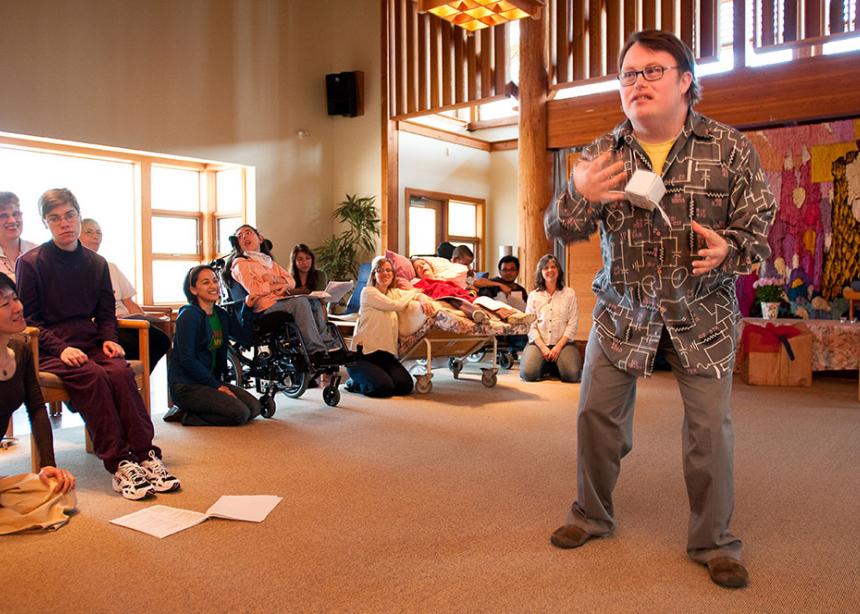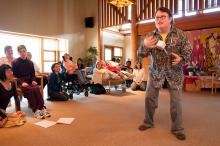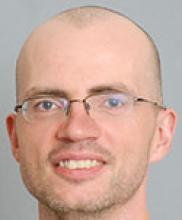Beige cement walls intersect with light green shag carpet. The smell of sugar and over-brewed yet weak coffee mingles with bits of conversation and the clink of spoons on ceramic church mugs.
It’s the social hour after the Sunday morning service at a mainstream Protestant church in Richmond Hill, Ont. I am here in the basement with Dan, a person with an intellectual disability. Dan and I live at L’Arche Daybreak, a home where people like Dan—known as core members—and assistants such as myself share life.
Although Dan is officially Anglican, he goes to this church because it is easily walkable. Dan and I are off to the side in the church hall, Dan sitting on his walker enjoying a coffee and donut, while I stand, wishing he would finish quickly so we can leave.
Then I see her, still 10 metres away but definitely coming toward us. Gray hair and in her mid-50s, she is a stalwart of her faith community. She is committed to social justice causes of all kinds. I know what she will say.
I steel myself. She arrives. After giving Dan a kind smile, she extends her hand to me and exclaims: “Thank you for coming to our church! I think L’Arche is such a great thing. You are doing such a good work!”
Hoping to cover my annoyance, I force a smile and a polite response before she departs to converse with another pod of parishioners.
She doesn’t get it. People rarely do.
Dan’s mission
I have heard similar comments from Christians of all stripes. Although spoken in kindness, the assumption behind the words betrays a typical assumption that only “saints” could have the patience to “care for” such pitiable, difficult and strange people.
I held this view, too, before I first came to L’Arche in 1999. While I would have simply stated that working at L’Arche was “not for me,” in truth I could not have imagined living life with people I viewed as defective and damaged. Yet God interrupted my plans and called me to this community in spite of myself.
It didn’t take long after entering L’Arche Daybreak in Richmond Hill to arrive at a very different idea of people with intellectual disabilities. Living at L’Arche—sharing life and faith together in community—gave me a renewed purpose of being a Christian. But not because it enabled me to help the “unfortunates.” Rather, entering into relationships with core members transformed my whole perception of what it means to be human. Living with Dan became much more than merely “taking care of him.” Instead, I began to understand him as a friend and teacher, with a God-given mission to reveal Jesus to me.
Years later, when I embarked on graduate theological studies, it was Dan and other core members I lived with over the course of 11 years who provided the inspiration for much of my reflection on Christian life and practice. I have come to believe that theological reflection needs the lives of people with intellectual disabilities to show old and new ways of being faithful. In this way, Dan continues to extend his mission to the wider church and world.
My story of transformation and mission could not have taken place outside of L’Arche, a particular and embodied manifestation of the gospel. Only such a culture could transform my stereotypes and fears into the friendship and mutuality of the reign of God.
L’Arche dates back to the fall of 1963, when Jean Vanier, son of famed Canadian Governor General Georges Vanier, was wondering what to do with his newly minted Ph.D. in the ethics of Aristotle. He wished to follow Jesus, but remained unsure how to proceed. At the invitation of his spiritual director, Father Thomas Philippe, Vanier decided to visit the institution where Philippe was chaplain. The institution was one for people with intellectual and physical disabilities in Trosly-Breuil, France, where Vanier lived at the time. This visit changed Vanier’s life.
The cries of anguish from the men he encountered during that visit deeply moved Vanier, eventually compelling him to respond not with money or expertise, but with his life. In the fall of 1964, Vanier purchased a small house in Trosly-Breuil and invited two men from the institution to live with him. He called it “L’Arche,” French for “the ark,” a refuge and location for the birth of a new covenant. As L’Arche grew, more people came to “assist” him in his vocation—hence the label “assistant” for non-disabled members.
Although Vanier may have begun L’Arche as a rescue movement to save people from institutional life, a new rationale for his growing community quickly arose. Instead of seeing his new housemates merely as poor unfortunates in need of Christian generosity, Vanier began to see them as teachers of the most profound lessons.
Earlier in life, Vanier’s time as a naval officer had taught him to be strong and efficient. Then the academy formed him into a powerful intellectual. But people with intellectual disabilities taught him how to love and be in communion with others. He learned to accept his own vulnerability and weakness as part of his belovedness. Loving gently and tending to human fragility represented not romantic sentimentality, but the essence of the peace of Christ. When the intense anguish of others awoke in him an unconscious aggression, or violence, as he has called it, Vanier found a new nonviolent path to happiness modelled by many of his new friends.
For Vanier, people with intellectual disabilities had to be at the centre and heart of the community’s life. They were the “core members,” drawing the others into deep friendships and transforming their worldviews into ones more faithful to the way of Jesus. L’Arche proved an ideal manifestation of the profound social reversals proclaimed by Jesus. In L’Arche, Vanier saw reflected the gospel’s upturning of the hierarchical pyramid of society into Paul’s body of Christ, where the poorest ones had the most honoured position. Crazy though this community appeared, the truth it carried meant that L’Arche grew into an internationally renowned federation of communities.
It would be easy to write L’Arche off as a good story of a “specialized” community, but too idealistic for the “real world.” I have heard people say that L’Arche is nice for warming the heart, but irrelevant to the major global challenges that confront humanity. The same sentiment comes, either explicitly or implicitly, from many people in the church. Care for the weak is applauded, but things like peace, justice, international development and even personal devotion are given more attention.
Disabled theology
Those of us who identify as Anabaptist Christians often espouse a discipleship of the strong and able, needing to leap tall conflicts in a single bound or be the ever-generous donor. This kind of super-faith can often cohere with our culture’s obsession with independence and effectiveness, values that cast long shadows on the people lost at the bottom of society. A theology of strength and ability simply can’t work for them.
In my studies at Anabaptist Mennonite Biblical Seminary in Elkhart, Ind., over the past few years, I tried to interrogate this super-faith by introducing the perspective of my friends at L’Arche. This surprised and intrigued fellow students. For many of these bright future leaders, the mode of looking at personal faith mostly consists in rational decisions and forms of community based on individuals independently choosing their own faith in a voluntary association with others. Encountering people who are limited in the ability to choose their own destiny seemed to blindside some students. Having grown up on a diet of individual spirituality, when these students were confronted with the lives of my friends they were forced to think for the first time that Christian faith is as much about what “we” believe as what “I” believe.
Christian faith is not just about my own beliefs, experience or good works, all done in combination with other like-minded individuals. It is as much a social reality as an individual one in which my own convictions and ability weigh less than the communion and faith that comes from being a body. When my friend Buddy from L’Arche comes to church less from personal intention than a longing to belong to a body of believers, his faith is just as legitimate as mine.
While some people at seminary ignored my attempts to interrupt theology with the lives of people with intellectual disabilities—which is okay—others expressed sincere gratitude. I believe the church needs people who can intrude on the faith of the strong with more vulnerable, and thus more human, reality. Bringing the lives of core members to bear on Christian theology and practice reminds us that notions of grace and community are not optional.
But what the church really needs is not people like me to tell stories and reflect theologically; rather, it needs people with intellectual disabilities in its midst, people who can draw us out of our heads and frenzied activities, and into our hearts and our bodies. Befriending these strangers of postmodern culture has the potential to reveal gifts that can convert us into disciples ready to follow and meet Jesus in the forgotten places and people of society.
Communities like L’Arche act as examples for the church by offering locations of revolution where unlikely people meet and transform one another into friends and truer human beings. If the church truly welcomes difference and diversity, it not only makes room for those people society devalues, but embraces them as those able to renew and refresh the gospel message.
A morning grace
People like Jane, for instance. Jane was an impossible-to-forget core member who transformed many lives with her indefatigable spirit, utterly unique personality and zest for life. By the time I lived with her, Jane also had dementia. Yet we didn’t see her as “the person with dementia” manifesting “problematic behaviour” and living the “death sentence” most people associate with Alzheimer’s disease. For those of us who lived with her, Jane was just Jane, and we delighted in her presence.
Jane’s very non-normative gifts were many. She loved throwing things down the toilet when assistants weren’t paying attention. (“Watch out for your backpack!”) She had a fondness for books, especially when she could tear them to pieces. A full glass of water was never safe with Jane at the dinner table, and her “chair art” in the hallways was legendary.
Jane also gave remarkable hugs. Being institutionalized for many years before coming to L’Arche meant that she was often afraid of men, and thus the female assistants were the chief beneficiaries of her embraces. But sometimes the male assistants would get one, and they often came as surprisingly transformative graces.
One such day was a bright summer morning. It was my turn to be up at 6 a.m. when the overnight person went home and before everyone else woke up. Everyone except Jane. She had her own sleep patterns and was usually already up. Groggy and exhausted, I came up to the kitchen to make coffee.
Then I saw Jane come toward me. “Hello!” she said with that unmistakable I-am-going-to-give-you-a-big-hug look. Sensing the privilege, I knelt down–Jane was about half my height–and let her wrap her arms around me, gently patting my back the way she did when she hugged people. When I sensed it was time to finish, I released my arms, but Jane did not. She just kept gently patting my back, somehow caring me into existence. “Slow down,” she seemed to be saying through her hands, “slow down and receive this gift.”
And for a moment I did. And as I did, I received a glimpse of the holy contemplative rest Jane had given to so many assistants throughout her years at L’Arche. Then Jane decided the hug was over and matter-of-factly walked back into the living room. I got up and made the coffee in a wholly different mode of being, interrupted and revived.
Jane, who has since passed away, never received a Nobel Peace Prize. She never gave an eloquent speech on peace. But she helped form countless men and women into true disciples of God’s shalom. I was not the generous superior who gave out of my abundance to alleviate Jane’s poverty. Instead, I received peace from one of Jesus’ (un)usual friends and slowly moved closer to the radicalness of the gospel. Jane embraced, rather than eliminated, my difference. She perceived me as a stranger to host, rather than a hostile “other” to fear.
What greater work of peace does the church have in our time than this hospitality? We dare not miss those people God has chosen to convert us to the gospel. We dare not miss the commu-nities that embody God’s friend-making mission to the world.
So the next time you see me in your church with Dan or Jane, extend to them your hand and exclaim: “I am so glad you are in our church! You are doing such a good work!”
Jason Reimer Greig is a recent graduate of Anabaptist Mennonite Biblical Seminary. He now lives with his family in Wissen, Germany, where he is pursuing potential doctoral studies.
See also:
In “Differently gifted” Will Braun discusses the high emotional stakes related to the closure of facilities for people with intellectual disabilities.
In the web-exclusive piece, “More viewpoints: Differently gifted” Will Braun gives links to more background on this topic.
For discussion
1. What contact have you had with individuals with intellectual disabilities? What qualities are necessary for those who work with these individuals? How does your congregation help those with intellectual challenges feel included? What blessings can these weaker members offer to a congregation?
2. Do you agree that we tend to have a theology of strength and ability? How much does your congregation value care for the weak? Do you agree with Jason Reimer Greig that Christian faith is not just personal, but comes from being a body? What can the weak among us teach us about friendship, community and peace?
3. What are some of the big challenges facing families who have members with intellectual disabilities? What services are available in your area? How are the churches plugged into these services? Is there a role for institutions in caring for those with disabilities?
4. If society tends to see people with intellectual disabilities as “defective and damaged,” what does it take to change that view? How can the church better learn to see the weakness of strength and the strength of weakness?
—By Barb Draper






Comments
I think communities like L'Arche are indeed "doing a good work", but a 'good work' that is quite basic to Christian values. The 'good work' of being a friend, and building a relationship is a rudimentary expression of God's love.
It is unfortunate if persons or groups of persons are placed into a category of 'more difficult to love'. As Will Braun's article suggests, the church should be leaders in dismantling unhealthy categories and stretching people towards a new definition of 'normal'. It is precisely the context of the church that the most broadest definition of normal is revealed. All people need love and restoration. All persons are embraced by a loving and passionate Creator. All persons, loved by God and embracing that love become the community of faith.
I welcome an understanding of normal that embraces the moment, is uninhibited in expressing emotions, and generally meets people with acceptance and love. For those in my life with 'disabilities', such expressions as normal.
Add new comment
Canadian Mennonite invites comments and encourages constructive discussion about our content. Actual full names (first and last) are required. Comments are moderated and may be edited. They will not appear online until approved and will be posted during business hours. Some comments may be reproduced in print.